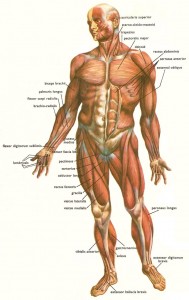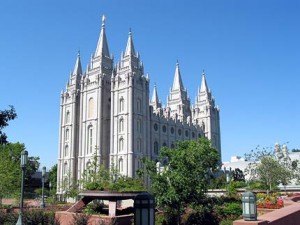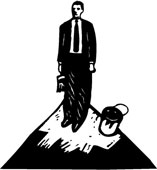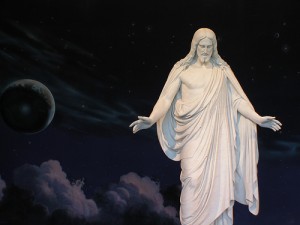For the past two years I have sat for probably thousands of hours learning and studying about the human body as a medical student. The more I learn, the more I realize that our God truly is God. It is amazing to think that there is someone who knows perfectly how our bodies work and what each little enzyme does, exactly how each muscle contracts, and so on. We think that we know a lot, and we do, but there is so much more to learn.

With regard to physical health, it is important that we take care of our bodies and part of that process involves being wise in what goes into our bodies. God revealed to Joseph Smith a general outline of how we should do this. This is known as the Word of Wisdom (Doctrine and Covenants 89). I find that by patterning my physical lifestyle and health philosophy after the Word of Wisdom is liberating–I feel better about who I am, I am healthier, and I have faith that God will bless me with certain things that he has promised to those who live by the Word of Wisdom (see below). I hope to encourage you to see the wisdom that is found in living the principles found in the Word of Wisdom.
As I have thought about how I should live my life with regard to physical health, I often think of what Paul teaches the Corinthians (1 Corinthians 3:16-17; 1 Corinthians 6:19):
“Know ye not that ye are the temple of God, and that the Spirit of God dwelleth in you? If any man defile the temple of God, him shall God destroy; for the temple of God is holy, which temple ye are (1 Cor. 3-16-17) . . . For ye are bought with a price: therefore glorify God in your body, and in your spirit, which are God’s (1 Cor. 6:19).”

I don’t think that it could be any more plain–we are supposed to take care of our bodies in every way, because they are temples, temples where the Holy Ghost resides. Furthermore, our bodies aren’t ours, they are God’s, because they have been bought with the blood, tears, and suffering of our Savior, Jesus Christ. Therefore, we should take care of them.
I truly hope that you will think about how you treat your body. Do you maintain your temple by eating properly, exercising sufficiently, and sleeping the right amount? I believe, based on what Paul teaches, that we will be held accountable before God for the way that we have treated our bodies.
So, how does the Word of Wisdom apply? The Word of Wisdom and what Paul teaches are in essence the same thing, but the Word of Wisdom gives a few more guidelines for how to maintain our “temples”. The point that I want to emphasize are the promises that God gives to those who live their lives according to the Word of Wisdom (D&C 89:18-21). He states:
“And all saints who remember to keep and do these sayings, walking in obedience to the commandments, shall receive health in their navel and marrow to their bones; and shall find wisdom and great treasures of knowledge, even hidden treasures; and shall run and not be weary, and shall walk and not faint. And I, the Lord, give unto them a promise, that the destroying angel shall pass by them, as the children of Israel, and not slay them. Amen.”
Just as the destroying angel passed over those houses in Egypt that had the blood of a lamb painted on their door post (a reminder that it was the blood — Atonement — of the real Lamb saving them from destruction), those that abide by the Word of Wisdom will also not be hewn down. Furthermore, health, strength, and treasures of knowledge will flow into our lives. I know that these promises are true, because I have seen them come into effect in my own life.
What does the Word of Wisdom teach us about health? After the Lord lays out what we shouldn’t take into our bodies, He discusses what we should eat and how we should eat. He states that we should eat mostly grains (D&C 89:14, 16), lots of fruits and vegetables (D&C 89:10-11, 16), and we should eat meat sparingly. And when we do eat meat it should be during the winter or when there is a famine (D&C 89:12-13). The diet that the Lord prescribes is a very sound diet. Your body doesn’t need a lot of excess meat, what it needs most of is glucose and that is supplied by grains, fruits and vegetables. Of course you can’t leave out the fact that their are essential amino acids, fats, and vitamins that we need from meat. But if you eat just a small quantity of meat and variety of fresh fruits and vegetables, you will get everything that you need.

In addition, the Lord teaches us that we need to use all of our food with thanksgiving and prudence (D&C 89:11). I find it interesting that he says prudence. According to the 1828 version of Webster’s dictionary, prudence means wisdom applied to practice. This might be a stretch, but what I take away from that is that we need to be wise in how we eat–generally, we should eat less than what we typically do and we need to eat good wholesome foods (double-bacon cheeseburgers, fries, and many store-prepared foods really don’t fit in this category).
I wish that I could talk more about health, there is so much to say, but I don’t think that this is really the forum for that. Please take care of your body by eating wisely, consuming the right amount and types of food, and exercising regularly. It will reap benefits in your life and from what the Lord and Paul teach, we will be much happier and live longer if we do.






 About this time of year, many people get excited about the new year. A new year can be a new beginning and an excellent point to check life’s milestones, past goals and access one’s personal situation in life. It doesn’t necessarily take a new year to do this, but it seems like a good time to start anew. Coming up on this new year, I have heard and listened to a few people talk about their resolutions and others (at church, for example) speak about how best to go about fulfilling those resolutions because, let’s face it, everyone has had goals that were never completed and that were eventually discarded. This year, I’m thinking about a new approach.
About this time of year, many people get excited about the new year. A new year can be a new beginning and an excellent point to check life’s milestones, past goals and access one’s personal situation in life. It doesn’t necessarily take a new year to do this, but it seems like a good time to start anew. Coming up on this new year, I have heard and listened to a few people talk about their resolutions and others (at church, for example) speak about how best to go about fulfilling those resolutions because, let’s face it, everyone has had goals that were never completed and that were eventually discarded. This year, I’m thinking about a new approach. There are a few reasons for this, and I’d like to address one in particular. I have found in my own life, that even though my desire to improve is pure and my resolve strong, there are weaknesses because I am not thorough enough and there is usually something else in which I allow myself indulgence. How can I receive full strength from the Lord in breaking a bad habit when I
There are a few reasons for this, and I’d like to address one in particular. I have found in my own life, that even though my desire to improve is pure and my resolve strong, there are weaknesses because I am not thorough enough and there is usually something else in which I allow myself indulgence. How can I receive full strength from the Lord in breaking a bad habit when I 

